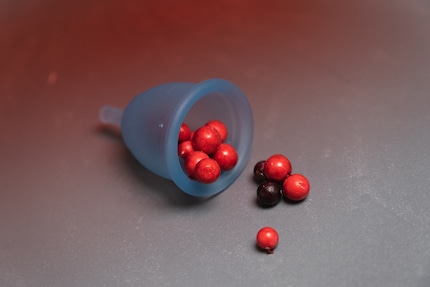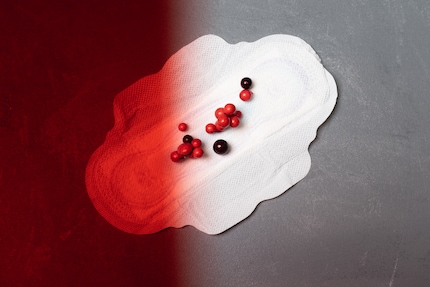
Guide
Sporty periods: how to increase your performance with cycle-focused training
by Katja Fischer

My period doesn’t exactly put a smile on my face. There are numerous reasons for this. Continue reading to hear three experts talk about the positive aspects of menstruation and living in harmony with your cycle.
My tampon is leaking as I search for the right words to start this article. I feel the warm blood flowing into my underpants, the fabric soaking it up. I feel restless and uneasy. In a panic, I run to the bathroom.
Ta-dah: prologue.
Many of you probably didn’t want to read these first lines, and find articles like this offensive and «disgusting». Others find it refreshingly honest, even important, that I talk about my daily life as a person that menstruates as if it were Apple news. Disparaging comments on the subject of menstruation relate to my point of view just as much as the little mountain hut to a big city. There are worlds in between. But to accept my period as nature’s miracle, as it’s often demanded? I’m not there yet. My truth lies somewhere in the middle. I wish for a change in perspective that would let me see past the period as a monthly burden. To achieve this, I looked for support from three experts. They helped me find answers to my question: how can I experience my period more positively?
«How you perceive your period depends largely on whether and how you were introduced to the topic,» explains sex therapist Dania Schiftan. Pitying statements such as «oh no, you poor thing» or «that’s a disgusting issue» accompany many menstruating people from the first bleeding on. Including myself. «People who have never been educated at all are terrified of what’s happening to their bodies. That’s a negative perspective that people who menstruate experience from a young age,» Schiftan says. Pain, disgust, and hypersensitivity are frequently mentioned negative associations in this context. Without this perspective, the period appears in a different light. «Hypersensitivity turns into sensibility. This is a quality that we perceive as positive and see as a strength,» says Schiftan.
Josianne Hosner (website in German) advocates for a change in perspective. She’s a cycle expert and author of the book «Back to the Roots – Zyklisch leben mit immenser Freude», meaning how to live in synchronisation with your cycle. She educates people about the menstrual cycle through classes. For example, about the hated PMS. The abbreviation stands for premenstrual syndrome and summarises various physical and psychological symptoms, such as mood swings or pain, that can occur before bleeding. PMS is often mentioned in a negative context.
«This time frame in the cycle allows us clarity, focus and concentration. That’s a completely different narrative. That’s why I prefer to call it the no-bullshit phase,» says Hosner, taking a very different approach. Instead of demonising my hormones, I should use them to quality control my circumstances. «Hormonal changes help you recognise messed up situations and feel more clearly what’s right for you and what’s not.»
According to Hosner, a more or less regular menstruation is a vital sign, similar to blood pressure, pulse or body temperature. «It’s only through the menstrual cycle of our mothers that we’re here today.» No menstruation, no human beings.
Bea Loosli also preaches this. She’s a contraception coach and created the online women’s portal «Ladyplanet» (website in German), where she’s dedicated to the topic of «natural womanhood». According to her, menstruation has a strong symbolism because it represents the origin of every human being: «We were all once nothing more than an egg and a sperm. The monthly bleeding reminds us that we’re all the same. Our uterine lining rebuilds and breaks down every month unless we have been fertilised. The lining is a precious nutrient without which new life wouldn’t be possible. It’s then carried away by the blood. There’s so much strength in menstruation.» And yet we think of bleeding as a weakness.
As insightful as I find these points, I need practice thinking differently about my menstruation. All three experts suggest the concept of «cyclical living» to me. The philosophy behind it: making my cycle work for me. «If you accept and value your period as a part of life, new possibilities open up,» Schiftan says.
According to Hosner, the circa four-week cycle consists of four phases. Menstruation itself is just one of them. «Due to hormones, we don’t always feel the same during each phase. However, this isn’t a disadvantage, but an advantage. We have merely lost the understanding of it,» Hosner said. To illustrate these phases, Schiftan compares the monthly cycle with a yearly circle. The cycle is subject to something akin to internal seasons. It’s a lot to cover and I’ll go even deeper into it in an upcoming post. «The ‹winter months› represent the phase when we need to take more breaks and rest. The inner ‹spring› brings creativity, while the ‹autumn› brings emotions to the forefront. And in ‹summer›, we’re bursting with energy and drive. Were productive.» These insights are also important in the world of women’s sports, where cyclic training (article in German) is becoming more common.
«No one would dismiss the bear’s hibernation as burdensome.»
In nature, such phases are self-evident. Day, night. Spring, summer, autumn and winter. Everything changes. Everything is in flux. «No one would dismiss the bear’s hibernation as burdensome. In the animal world, we accept this cycle. Why not with us humans?»
A cyclical life requires introspection. Just 30 seconds of tracking per day can help, according to Hosner. To do this, I’m asked to think about the following questions: When do I have a lot of energy, when do I have little? When do I sleep well, when do I not? When do I binge eat, and when do I worry? When do I feel melancholy or pleasure? When am I tired or driven? «Observe yourself over several cycles. Write it all down. Finally, compare your observations. That’s when things get really exciting,» says cycle expert Josianne Hosner.

According to sext therapist Dania Schiftan, if we want to create a society where people unashamedly ask someone for a tampon at the dinner table, we need to start early. «Many young children accompany their parents to the bathroom. Periods shouldn’t be hidden from them. This way, children learn from an early age that bleeding is something natural that’s a part of life.» According to Hosner, playful, explanatory sentences are a great tool – for example, «The uterus is the cosy cave in which you grew, and it’s cleaning itself right now. That’s why we’re going to get all comfy today and tomorrow.»
Bea Loosli agrees that the family plays an important role in this matter: «The family must set an example of open and appreciative interaction. Only then will it become a natural part of our everyday lives. But to do that, people have to be willing to let go of outdated, rigid beliefs.» For example, that periods are disgusting and a private matter. «The better adults understand their own bodily functions and the more they’re at peace with them, the easier it’s for them to communicate them. Change starts with you,» adds Schiftan.
The role of the man is very important too, Hosner emphasises: «There’s no better role model for children than when the man says, ‹I’ll take over mommy’s chores again now so she can rest during the bleeding.› Menstruation is as normal as eating, drinking, sleeping. Once a month, we take a step back – pain or no pain – and then we’re back in full force. When parents model this as a matter of course, girls and boys learn it’s okay that we’re not equally resilient every day.» According to Schiftan, a lot of the taboo problems we have are due to gender segregation. «You get the feeling that periods are only relevant to people who menstruate. But everyone must be educated equally. Periods are everybody’s business.»
«We don’t have to celebrate the period if we don’t want to. But we need to normalise it, and we need to be open about it.»
According to sex therapist Schiftan, tampons, pads and cups should be shown, explained and made freely available in sex education classes. «At the moment, we lack a certain amount of casualness.» In such classes, feelings such as disgust, shame or devaluation should be noted and discussed. «Many prepubescent children only know periods as blue liquids from advertising. But this is far removed from the bloody reality, and a lot of people are ashamed.» In addition, the umbrella term «hygienic products» for tampons, pads and the like implies that periods are something unhygienic.
«We don’t have to celebrate the period if we don’t want to. But we need to normalise it and we need to talk about it openly. Only then do we understand that breaks are okay and can help ease menstruation discomfort, among other things. But no one wants to hear that in our performance-oriented society,» says Josianne Hosner. At the same time, we need the peace and quiet. Athletes know that after each marathon, there’s a regeneration phase. «Our fast-paced everyday lives and the pressure to perform resemble a marathon. Without breaks, we burn out. Menstruation is a good time to unwind.»
But what could such a world look like, in which menstruation is no longer just talked about in whispers behind closed doors?

«I remember an advertisement by the Always pad brand. In it, the protagonist says that despite her menstruation, she always wants to give 100 per cent. This is our reality. If we lived in a society that didn’t taboo or devalue menstruation, we could be considerate of cyclical differences and phases instead of trying to hide them,» Schiftan says. According to her, in private life, at school as well as in professional life, it would be okay for women to perform differently depending on the phase of their cycle – and to be judged accordingly. In addition, people who menstruate would feel more comfortable thanks to the flexibility.
«Globally, there would be less poverty in such a world.»
Feelings of shame would be a reminder of times long gone. According to Hosner, the result would be a more loving relationship with one’s own body and increased self-worth. «We would no longer have to listen to unkind things such as ‹Shitty mood again, are you on your period?› Furthermore, I’m convinced that a cyclical life, i.e. a daily life in the knowledge of the qualities of the four-cycle phases, would prevent many burnouts. From a global perspective, there would also be less poverty in such a world, because, especially in poorer regions, many girls drop out of school as soon as they have their first menstruation. They initially lack access to sanitary pads and the like and later lack career prospects. The cycle of poverty continues.»
There are still many small steps to take before such a world is achieved. Steps that add up to make a big difference. For my part, I will take one of them and further my knowledge on «cyclical life». I will report on my findings and progress in future posts. Josianne Hosner’s book is already on my nightstand...
As a massive Disney fan, I see the world through rose-tinted glasses. I worship series from the 90s and consider mermaids a religion. When I’m not dancing in glitter rain, I’m either hanging out at pyjama parties or sitting at my make-up table. P.S. I love you, bacon, garlic and onions.
Practical solutions for everyday problems with technology, household hacks and much more.
Show all